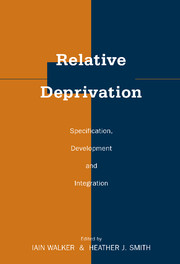Book contents
- Frontmatter
- Contents
- List of Contributors
- 1 Fifty Years of Relative Deprivation Research
- PART ONE SPECIFICATION
- PART TWO DEVELOPMENT
- 6 Personal and Group Relative Deprivation: Connecting the ‘I’ to the ‘We’
- 7 “Poisoning the Consciences of the Fortunate”: The Experience of Relative Advantage and Support for Social Equality
- 8 The Embeddedness of Social Comparison
- 9 Japanese and American Reactions to Gender Discrimination
- 10 Collective Action in Response to Disadvantage: Intergroup Perceptions, Social Identification, and Social Change
- PART THREE INTEGRATION
- Part Four Conclusion
- Index
7 - “Poisoning the Consciences of the Fortunate”: The Experience of Relative Advantage and Support for Social Equality
Published online by Cambridge University Press: 29 September 2009
- Frontmatter
- Contents
- List of Contributors
- 1 Fifty Years of Relative Deprivation Research
- PART ONE SPECIFICATION
- PART TWO DEVELOPMENT
- 6 Personal and Group Relative Deprivation: Connecting the ‘I’ to the ‘We’
- 7 “Poisoning the Consciences of the Fortunate”: The Experience of Relative Advantage and Support for Social Equality
- 8 The Embeddedness of Social Comparison
- 9 Japanese and American Reactions to Gender Discrimination
- 10 Collective Action in Response to Disadvantage: Intergroup Perceptions, Social Identification, and Social Change
- PART THREE INTEGRATION
- Part Four Conclusion
- Index
Summary
Men of ressentiment, physiologically unfortunate and worm-eaten, a whole tremulous realm of subterranean revenge, inexhaustible and insatiable in outbursts against the fortunate and happy and in masquerades of revenge and pretexts for revenge: when would they achieve the ultimate, subtlest, sublimest triumph of revenge? Undoubtedly if they succeeded in poisoning the consciences of the fortunate with their own misery, with all misery, so that one day the fortunate began to be ashamed of their good fortune and perhaps said one to another: “it is disgraceful to be fortunate: there is so much misery!”
(Friedrich Nietzsche, 1887/1967, On the Genealogy of Morals, p. 124)Most challenges to inequality are based in a profound sense of relative deprivation (see Wright & Tropp, this volume). This has led many to examine the resentment of the disadvantaged as the sine qua non of social change. In most cases, however, relative deprivation leads the disadvantaged into direct conflict with those either responsible for, or benefiting from, their deprivation. Unfortunately, we know little about how the advantaged experience others' deprivation relative to them. In this chapter we develop a phenomenology of relative advantage. We specify the various ways in which advantage can be experienced and discuss how each is related to support for social equality. As we shall see, however, there is a great deal working to prevent the recognition and disavowal of privilege.
- Type
- Chapter
- Information
- Relative DeprivationSpecification, Development, and Integration, pp. 136 - 163Publisher: Cambridge University PressPrint publication year: 2001
- 36
- Cited by

